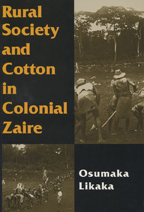African History / Rural Sociology / Agriculture / Economics
|
Rural
Society and Cotton in Colonial Zaire As local plots of food crops grown by individual households gave way to commercial fields of cotton, a whole host of social, economic, and environmental changes followed. Likaka reveals how food shortages and competition for labor were endemic, forests were cleared, social stratification increased, married women lost their traditional control of agricultural production, and communities became impoverished while local chiefs enlarged their power and prosperity. Likaka documents how the cotton regime promoted its cause through agricultural exhibits, cotton festivals, films, and plays, as well as by raising producer prices and decreasing tax rates. He also shows how the peasant laborers in turn resisted regimented agricultural production by migrating, fleeing the farms for the bush, or sabotaging plantings by surreptitiously boiling cotton seeds. Small farmers who had received appallingly low prices from the cotton companies resisted by stealing back their cotton by night from the warehouses, to resell it in the morning. Likaka draws on interviews with more than fifty informants in Zaire and Belgium and reviews an impressive array of archival materials, from court records to comic books. In uncovering the tumultuous economic and social consequences of the cotton regime and by emphasizing its effects on social institutions, Likaka enriches historical understanding of African agriculture and development. "Riveting. A major social and economic history of the Zairian countryside."—Allen F. Isaacman, University of Minnesota Osumaka Likaka is
assistant professor of history at Wayne State University. As
a young boy, he witnessed the last years of forced crop production
in Zaire with his father, an agricultural officer. He is also the author of Naming Colonialism: History and Collective Memory in the Congo, 1870-1960. |
|
|||||||||
|
If you have trouble accessing
any page in this web site, contact our Web manager. Updated 3/18/2014 © 2011, The Board of Regents of the University of Wisconsin System |
